| Listing 1 - 10 of 26 | << page >> |
Sort by
|
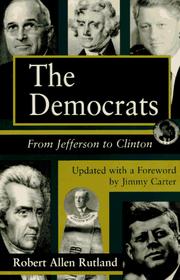
ISBN: 082626154X 9780826261540 0826210341 9780826210340 Year: 1995 Publisher: Columbia University of Missouri Press
Abstract | Keywords | Export | Availability | Bookmark
 Loading...
Loading...Choose an application
- Reference Manager
- EndNote
- RefWorks (Direct export to RefWorks)
Democratic Party (U.S.) --- Republican Party (U.S. : 1792-1828) --- Demokratische Partei (U.S.) --- Partai Demokrat (U.S.) --- History.
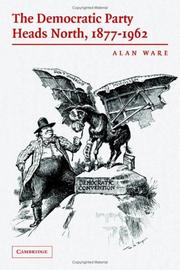
ISBN: 0521858275 0521675006 9780511388828 0511388829 9780511611506 0511611501 9780521858274 9780521675000 1107177316 1281254533 9786611254537 0511387830 0511386842 0511385013 0511383142 Year: 2006 Publisher: Cambridge New York Cambridge University Press
Abstract | Keywords | Export | Availability | Bookmark
 Loading...
Loading...Choose an application
- Reference Manager
- EndNote
- RefWorks (Direct export to RefWorks)
This book examines the dynamics of the American party system and explores how contemporary American politics was formed. Specifically, it asks how the Democrats could become sufficiently competitive in the American North as to be able to construct a national political majority. It rejects the conventional account, based on 'realignment theory', that between the end of Reconstruction and the Civil Rights Revolution, the base level of support for the Democratic party varied greatly from one era to another. Instead, by distinguishing between the 'building blocks' available to the Democrats in coalition formation and the aggregation of those 'blocks' into an actual coalition, the author shows that there was much less variation over time in the available 'blocks' than is usually argued. Neither the economic depression of 1893 nor the New Deal had the impact on the party system that most political scientists claim.
Democratic Party (U.S.) --- History. --- History --- Demokratische Partei (U.S.) --- Partai Demokrat (U.S.) --- Republican Party (U.S. : 1792-1828) --- Social Sciences --- Political Science
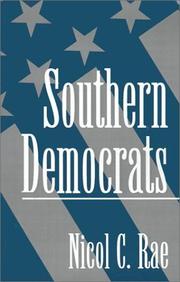
ISBN: 128044231X 0198024770 1423742230 1601299621 9781423742234 9781601299628 9780195087093 0195087097 9780195087086 0195087089 9781280442315 0195087089 0195087097 9780198024774 0197734022 Year: 1994 Publisher: New York : Oxford University Press,
Abstract | Keywords | Export | Availability | Bookmark
 Loading...
Loading...Choose an application
- Reference Manager
- EndNote
- RefWorks (Direct export to RefWorks)
Charts the rise of the southern Democrats as a force in American politics since the 1960s. Drawing on interviews with many southern politicians, it traces the history of southern Democrats from the erosion of their national influence in the early 1960s to the 1992 election of Clinton and Gore.
Political parties --- Democratic Party (U.S.) --- Republican Party (U.S. : 1792-1828) --- Demokratische Partei (U.S.) --- Partai Demokrat (U.S.) --- Southern States --- United States --- Politics and government
Book
ISBN: 9780801454837 0801454832 9780801453267 0801453267 0801454824 Year: 2014 Publisher: Ithaca London
Abstract | Keywords | Export | Availability | Bookmark
 Loading...
Loading...Choose an application
- Reference Manager
- EndNote
- RefWorks (Direct export to RefWorks)
In the decade before the Civil War, Northern Democrats, although they ostensibly represented antislavery and free-state constituencies, made possible the passage of such proslavery legislation as the Compromise of 1850 and Fugitive Slave Law of the same year, the Kansas-Nebraska Act of 1854, and the Lecompton Constitution of 1858. In Northern Men with Southern Loyalties, Michael Todd Landis forcefully contends that a full understanding of the Civil War and its causes is impossible without a careful examination of Northern Democrats and their proslavery sentiments and activities. He focuses on a variety of key Democratic politicians, such as Stephen Douglas, William Marcy, and Jesse Bright, to unravel the puzzle of Northern Democratic political allegiance to the South. As congressmen, state party bosses, convention wire-pullers, cabinet officials, and presidents, these men produced the legislation and policies that led to the fragmentation of the party and catastrophic disunion.Through a careful examination of correspondence, speeches, public and private utterances, memoirs, and personal anecdotes, Landis lays bare the desires and designs of Northern Democrats. He ventures into the complex realm of state politics and party mechanics, drawing connections between national events and district and state activity as well as between partisan dynamics and national policy. Northern Democrats had to walk a perilously thin line between loyalty to the Southern party leaders and answering to their free-state constituents. If Northern Democrats sought high office, they would have to cater to the "Slave Power." Yet, if they hoped for election at home, they had to convince voters that they were not mere lackeys of the Southern grandees.
Sectionalism (United States) --- Slavery --- History --- Political aspects --- Democratic Party (U.S.) --- Demokratische Partei (U.S.) --- Partai Demokrat (U.S.) --- Republican Party (U.S. : 1792-1828)
Book
ISBN: 1282298828 9786612298820 1576755479 9781576755471 9781609944230 1609944232 Year: 2008 Publisher: San Francisco : Berrett-Koehler,
Abstract | Keywords | Export | Availability | Bookmark
 Loading...
Loading...Choose an application
- Reference Manager
- EndNote
- RefWorks (Direct export to RefWorks)
Shows how the 3 core progressive values - Freedom, Opportunity, Security - define the collective aspirations that drive the American nation, and how progressives can use this framework of values to communicate with "persuadable" voters.
Liberalism --- Social values --- Liberal egalitarianism --- Liberty --- Political science --- Social sciences --- Democratic Party (U.S.) --- Republican Party (U.S. : 1792-1828) --- Demokratische Partei (U.S.) --- Partai Demokrat (U.S.) --- United States --- Politics and government
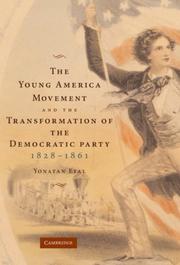
ISBN: 9780511511561 9780521875646 9781107407763 9780511335501 0511335504 0511511566 0521875641 1107407761 1107182212 1281040568 9786611040567 1139132954 0511334923 051133432X 0511333641 Year: 2007 Publisher: Cambridge ; New York : Cambridge University Press,
Abstract | Keywords | Export | Availability | Bookmark
 Loading...
Loading...Choose an application
- Reference Manager
- EndNote
- RefWorks (Direct export to RefWorks)
The phrase 'Young America' connoted territorial and commercial expansion in the antebellum United States. During the years leading up to the Civil War, it permeated various parts of the Democratic party, producing new perspectives in the realms of economics, foreign policy, and constitutionalism. Led by figures such as Senator Stephen A. Douglas of Illinois and editor John L. O'Sullivan of New York, Young America Democrats gained power during the late 1840s and early 1850s. They challenged a variety of orthodox Jacksonian assumptions, influencing both the nation's foreign policy and its domestic politics. This 2007 book offers an exclusively political history of Young America's impact on the Democratic Party, complementing existing studies of the literary and cultural dimensions of this group. This close look at the Young America Democracy sheds light on the political realignments of the 1850s and the coming of the Civil War, in addition to showcasing the origins of America's longest existing political party.
Democratic Party (U.S.) --- Demokratische Partei (U.S.) --- Partai Demokrat (U.S.) --- Republican Party (U.S. : 1792-1828) --- History --- United States --- Politics and government --- Economic conditions --- Arts and Humanities
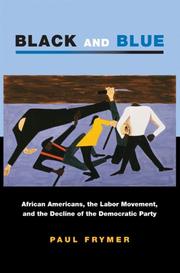
ISBN: 9780691134659 9780691130811 0691134650 0691130817 9786613133359 140083726X 1283133350 9781400837267 9781283133357 6613133353 Year: 2011 Volume: *17 Publisher: Princeton, NJ
Abstract | Keywords | Export | Availability | Bookmark
 Loading...
Loading...Choose an application
- Reference Manager
- EndNote
- RefWorks (Direct export to RefWorks)
In the 1930's, fewer than one in one hundred U.S. labor union members were African American. By 1980, the figure was more than one in five. Black and Blue explores the politics and history that led to this dramatic integration of organized labor. In the process, the book tells a broader story about how the Democratic Party unintentionally sowed the seeds of labor's decline. The labor and civil rights movements are the cornerstones of the Democratic Party, but for much of the twentieth century these movements worked independently of one another. Paul Frymer argues that as Democrats passed separate legislation to promote labor rights and racial equality they split the issues of class and race into two sets of institutions, neither of which had enough authority to integrate the labor movement. From this division, the courts became the leading enforcers of workplace civil rights, threatening unions with bankruptcy if they resisted integration. The courts' previously unappreciated power, however, was also a problem: in diversifying unions, judges and lawyers enfeebled them financially, thus democratizing through destruction. Sharply delineating the double-edged sword of state and legal power, Black and Blue chronicles an achievement that was as problematic as it was remarkable, and that demonstrates the deficiencies of race- and class-based understandings of labor, equality, and power in America.
Labor policy --- Labor unions --- African Americans --- Travail --- Syndicats --- Noirs américains --- History --- Civil rights --- Politique gouvernementale --- Histoire --- Droits --- Democratic Party (U.S.) --- United States --- Etats-Unis --- Race relations --- Relations raciales --- Noirs américains --- Demokratische Partei (U.S.) --- Partai Demokrat (U.S.) --- Republican Party (U.S. : 1792-1828) --- 20th century
Book
ISBN: 0674058453 9780674058453 9780674057173 0674057171 067426312X Year: 2012 Publisher: Cambridge, MA
Abstract | Keywords | Export | Availability | Bookmark
 Loading...
Loading...Choose an application
- Reference Manager
- EndNote
- RefWorks (Direct export to RefWorks)
Susan Dunn tells the dramatic story of FDR’s unprecedented battle to drive his foes out of his party by intervening in Democratic primaries and backing liberal challengers to conservative incumbents.
Roosevelt, Franklin D. --- Ruzvelʹt, Franklin, --- Rūzvilt, Franklin Dilānū, --- Rūzfilt, Franklin Dilānū, --- Lo-ssu-fu, --- Luosifu, --- F. D. R. --- R., F. D. --- FDR --- רוזוועלט, פראנקלין ד. --- רוזוועלט, --- Roosevelt, F. --- Roosevelt, F. D. --- Democratic Party (U.S.) --- Republican Party (U.S. : 1792-1828) --- Demokratische Partei (U.S.) --- Partai Demokrat (U.S.) --- History --- United States --- Politics and government --- HISTORY / United States / 20th Century.
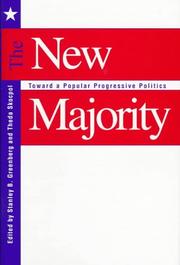
ISBN: 0585378533 9780585378534 9780300147414 0300147414 0300073410 9780300073416 0300078625 9780300078626 Year: 1997 Publisher: New Haven Yale University Press
Abstract | Keywords | Export | Availability | Bookmark
 Loading...
Loading...Choose an application
- Reference Manager
- EndNote
- RefWorks (Direct export to RefWorks)
In an era of widespread and unsettling change in workplaces, families, and communities, most Americans yearn for a government that will take their side. The contributors to this bold and visionary book argue that America is ready for a progressive politics with substance and bite. They contend that by embarking on a popular progressive course, the Democratic Party can become the moral voice-and practical partner-of all American families striving for a better life.This provocative book is a dialogue among Stanley B. Greenberg, Theda Skocpol, and other well-known thinkers. The contributors reject conservative answers to America's most pressing problems-fraying social ties, hard-pressed family life, sluggish economic growth, and widening gaps between the life circumstances of the most privileged and of everyone else. They discuss a renewal of the nation's social contract, suggest how to revitalize American democracy (not only by reducing the role of big money, but also by reconnecting people to politics), and explore how popular Democrats can fashion broad electoral alliances in the years to come. The Democratic party must undertake a new mission to champion the daily needs of Americans who work for a living, the authors maintain. In this period of change, America needs a government that does more, not less. By opting for a popular progressive course, Democrats can realign national debates and inspire a broad new electoral majority.Contributors:Alan BrinkleyMarc CaplanMichael C. DawsonJeff FauxMarshall GanzStanley B. GreenbergIra KatznelsonTheodore R. MarmorJerry L. MashawKaren M. PagetMiles S. RapoportMichael J. SandelTheda SkocpolPaul StarrMargaret WeirWilliam Julius Wilson
Progressivism (United States politics) --- Government - U.S. --- Law, Politics & Government --- Political Rights - U.S. --- Democratic Party (U.S.) --- United States --- Politics and government --- Economic policy --- Social policy --- Demokratische Partei (U.S.) --- Partai Demokrat (U.S.) --- Republican Party (U.S. : 1792-1828)

ISBN: 029598970X 9780295989709 9780295987514 0295987510 Year: 2007 Publisher: Seattle University of Washington Press
Abstract | Keywords | Export | Availability | Bookmark
 Loading...
Loading...Choose an application
- Reference Manager
- EndNote
- RefWorks (Direct export to RefWorks)
Journalists --- Political campaigns --- Presidents --- Political culture --- Political activists --- Political consultants --- History --- Election --- Van Dyk, Ted, --- Dyk, Ted Van, --- Democratic Party (U.S.) --- Republican Party (U.S. : 1792-1828) --- Demokratische Partei (U.S.) --- Partai Demokrat (U.S.) --- United States --- Politics and government
| Listing 1 - 10 of 26 | << page >> |
Sort by
|

 Search
Search Feedback
Feedback About UniCat
About UniCat  Help
Help News
News